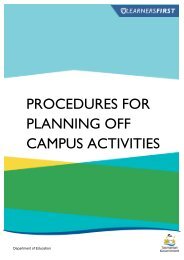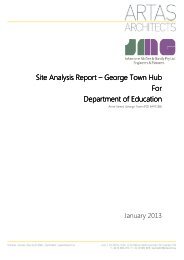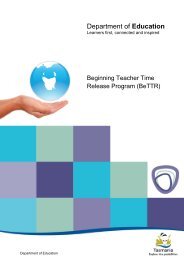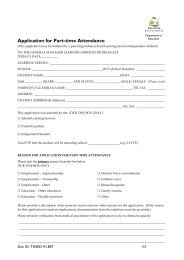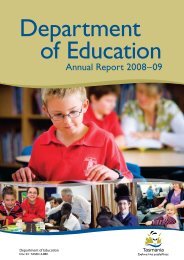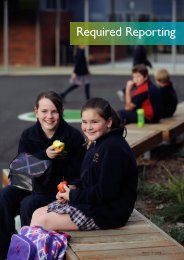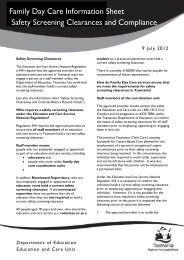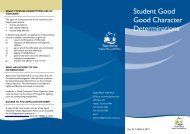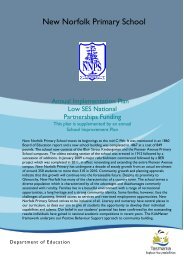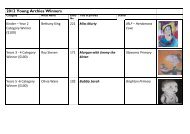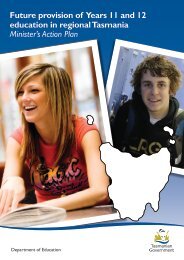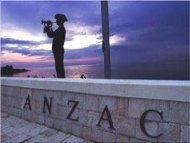Education
DoE Annual Report 2012-2013 - Department of Education
DoE Annual Report 2012-2013 - Department of Education
- No tags were found...
Create successful ePaper yourself
Turn your PDF publications into a flip-book with our unique Google optimized e-Paper software.
Direction<br />
The Department of <strong>Education</strong>’s focus for further<br />
education and training is to engage all Tasmanians in<br />
learning opportunities that will enable them to gain<br />
the skills and qualifications they need to contribute<br />
productively to our globalised community and economy.<br />
The priorities for the Further <strong>Education</strong> and Training<br />
Division are to:<br />
• promote higher education, vocational and adult<br />
learning throughout the community to encourage<br />
participation and create fulfilled and enriched<br />
Tasmanians<br />
• provide supported and relevant learning, knowledge<br />
and training opportunities to adult learners to ensure<br />
they are equipped with the skills to contribute<br />
productively to our community and economy<br />
• provide students with tangible pathways to further<br />
education and employment.<br />
During the 2012–13 reporting period through the<br />
Tasmanian Polytechnic, colleges 1 and some combined and<br />
regional schools, the department has provided further<br />
education and training opportunities to enable every<br />
Tasmanian to reach their potential at any stage of life.<br />
Improving the transition of students from Year 10,<br />
their engagement in programs in Year 11 and beyond,<br />
and their attainment of meaningful qualifications remains a<br />
significant focus for the department.<br />
Through the provision of a wide range of programs and<br />
delivery options including Guaranteeing Futures (pathway<br />
planning), Trade Training Centres and Australian schoolbased<br />
Apprenticeships, the department supports students<br />
to achieve a Year 12 qualification or equivalent, and a<br />
purposeful pathway into further education, training or work.<br />
Tasmania’s target is for 81.6% of students to attain Year 12<br />
or equivalent qualifications by 2015. This target represents<br />
Tasmania’s contribution to the national target of 90%<br />
Year 12 or equivalent attainment by 2015 set through the<br />
National Partnership Agreement on Youth Attainment and<br />
Transitions. Tasmania’s current attainment rate is 78.35% 2 .<br />
Government <strong>Education</strong> and Training International<br />
provides local and international students with an enriching<br />
educational experience while increasing enrolment<br />
numbers to benefit Tasmanian education providers and<br />
the community.<br />
In December 2011, the Minister for <strong>Education</strong> and Skills,<br />
the Hon. Nick McKim MP announced a review into<br />
the role and function of Tasmania’s public Vocational<br />
<strong>Education</strong> and Training (VET) providers, by independent<br />
consultant Virginia Simmons AO. As a result of the review,<br />
a new single entity, TasTAFE has been established using<br />
the combined resources of the Tasmanian Polytechnic<br />
and Tasmanian Skills Institute. TasTAFE, is covered under<br />
one piece of contemporary legislation and came into<br />
effect from 1 July 2013. This improved arrangement for<br />
the public provision of VET will result in quality training,<br />
improved outcomes and ease of access for learners.<br />
Further to the outcomes of the review, Skills Tasmania<br />
has now become a business unit of the Department<br />
of <strong>Education</strong>. This new arrangement will continue to<br />
maintain the strong links between the department and<br />
the Tasmanian business community to ensure that the<br />
skills and training needs of business enterprises are met<br />
appropriately, and will also facilitate a more streamlined<br />
alignment between Skills Tasmania and other business<br />
units of the department.<br />
1. Colleges were part of the Further <strong>Education</strong> and Training Division until<br />
the end of 2012. From 2013, colleges became part of the Early Years and<br />
Schools Division and are now referred to as senior secondary schools.<br />
2. COAG Reform Council’s report on the assessment of the National<br />
Partnership Agreement on Youth Attainment and Transitions attainment<br />
targets (August 2013).<br />
42 Post-Compulsory <strong>Education</strong> and Skills Development



